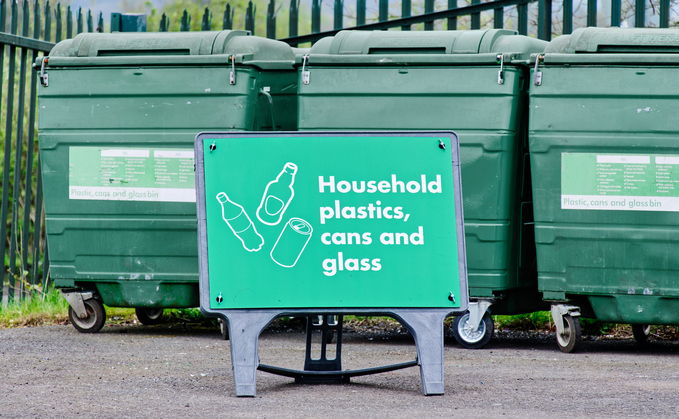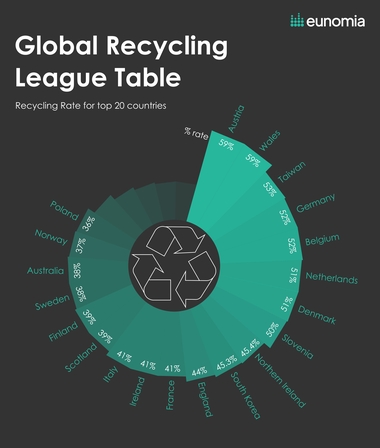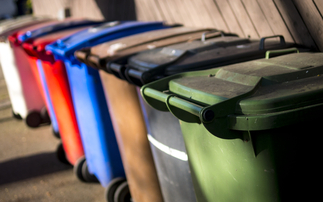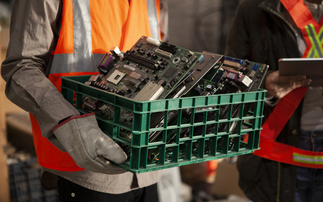
Credit: iStock
Study by Eunomia Research and Consulting and Reloop reveals which nations are among the world's highest recyclers - and how they do it
Austria and Wales lead the way as the countries with the highest recycling rate for household waste worldwide, according to the latest rankings published today by circular economy non-profit Reloop in collaboration with Eunomia Research and Consulting.
The research reveals Austria and Wales both recycled 59 per cent of their household or municipal waste collected last year. They were followed in the rankings by Taiwan, which achieved a 53 per cent recycling rate, just ahead of Germany and Belgium which both managed 52 per cent.
Other nations rounding out the top 10 include the Netherlands and Denmark on 51 per cent each, as well as Slovenia on 50 per cent, while Northern Ireland and South Korea both achieved a 45 per cent recycling rate, according to the study.
Published today to coincide with World Environment Day, the Global Recycling League Table - Phase One report examines the recycling performance of 48 countries worldwide. It includes nations which report the highest recycling rates and many of the world's largest economies, as well as lower income countries across Latin America, Asia, and Africa.
Europe leads the way with eight of the 10 top countries in the league table, alongside two east Asian nations, Taiwan and South Korea, both of which have long-established waste and recycling collection and treatment systems in place.
Within the UK, England stands at 11th place in the league table having achieved a 44 per cent recycling rate last year, while Scotland continued to languish behind its British neighbours in 15th place after recording a 39 per cent recycling rate.
As a whole, the UK's recycling rate has hovered around the 43 to 45 per cent mark for over a decade, according to official government data, despite a significant improvement in recycling rates in Wales.
Indeed, since the Welsh Government introduced a new waste strategy in 2010, which sets long-term, escalating targets for local authorities and financial penalties for missing them, recycling rates have increased dramatically in Wales from the 43 per cent rate recorded in 2010/11.
Wales' First Minister Vaughan Gething, said it was "fantastic news that Wales is now the world's second-best country for recycling", hailing it as evidence of "what we can achieve when people across Wales work together, aiming for ambitious targets, backed up by investment in facilities".
"Thanks to the efforts of households and workplaces across Wales, we have transformed from a nation with very low rates of recycling at the start of the century to one of the leading nations in the world and far ahead of the rest of the UK," he said. "This achievement belongs to all of us, and we are committed to improving recycling rates further still with the number one spot in the world our next target."

The report highlights how common features of countries with the highest recycling rates include having a formal waste and recycling strategy backed by clear goals and steps for improvements, and widespread collection services for common recyclable materials.
Other effective measures include extended producer responsibility (EPR) policies to incentivise producers to avoid unnecessary packaging, and financial and behavioural incentives to encourage homes and businesses to recycle, the report said.
Eunomia said the findings underscored the importance of long-term investment in making recycling convenient and efficient, "as well as the role that establishing behavioural norms over many years plays in creating a recycling culture".
However, the report also confirms none of the world's top recycling nations have yet managed to exceed a 60 per cent rate for municipal waste, once differences in reporting practices were accounted for.
Moreover, several nations covered by the study saw their recycling rate slip last year, including Germany, Spain, South Korea, and Singapore. But a handful of countries also saw adjustments increase their position or compensate for the fact that they were not reporting recycling rates, with China and South Africa the biggest beneficiaries, Eunomia said.
Joe Papineschi, chairperson at Eunomia Research and Consulting, said standardised, consistent reporting of waste and recycling data was key to building a successful long-term strategy for curbing waste levels across any nation. Countries should therefore look to use a clear and consistent definition of municipal waste, separate reporting by type of waste, and adopt recycling practices that are associated with some of the highest performing nations set out in today's league table, he said.
"It is very important to understand how each country around the world is performing in terms of waste generation and recycling of the generated waste so that we can accurately track the progress on moving towards a more circular world economy," he added. "This Eunomia initiative will enable us to do that, with 48 countries already included in this phase, and more countries to be added in the subsequent phases."
Research authors analysed the official municipal waste and recycling data reported by each country, and then compared it on a like-for-like basis. In order to present the results on a consistent basis, they also used underlying waste data and other published sources of information to adjust the results where necessary.
In cases where there was no recycling rate had been officially reported, Eunomia said it used figures that approximated municipal recycling levels.
The study also looked at recycling rates for glass, aluminium and plastic beverage containers. Whilst data availability was more limited, for the countries with data available, authors found that metal beverage containers typically achieved the highest recycling rate at 78 per cent, followed by glass recycling at 64 per cent and plastic recycling rates of 63 per cent.
But the research found "big differences" in the amounts of beverage containers being placed on the market by the countries in the study. It said countries with the highest amounts of beverage containers placed on the market - the US for plastics, Australia for glass, and South Africa and the US for metals - had some of the lowest collected for recycling rates.
Today's publication is intended as the first edition in a two-phase study, with the second paper slated for publication this autumn ahead of the final round of crunch UN plastic waste treaty talks. The second edition is set to cover a larger number of countries, Eunomia Research and Consulting said.
The research was funded in part by recycling tech specialist TOMRA, the Welsh Government, the International Aluminium Institute, and the Can Manufacturers Institute, in collaboration with Reloop.
"Increasing all countries' recycling rates is key in preventing overuse of the world's resources, and our 50-year experience in the field has taught us that targets must be specific for efforts to have maximum effect," said Tove Andersen, president and CEO at TOMRA. "The lack of international standardization on exactly what should be measured, at which point in the recycling process, however, has made cross-country comparisons notoriously difficult. Uncovering which nations are actually the greatest recyclers, allows for application of best practices across borders, and increased recycling rates for all."
This article is sponsored by Eunomia Research and Consulting. Eunomia is a partner of the UK Green Business Awards 2024.







